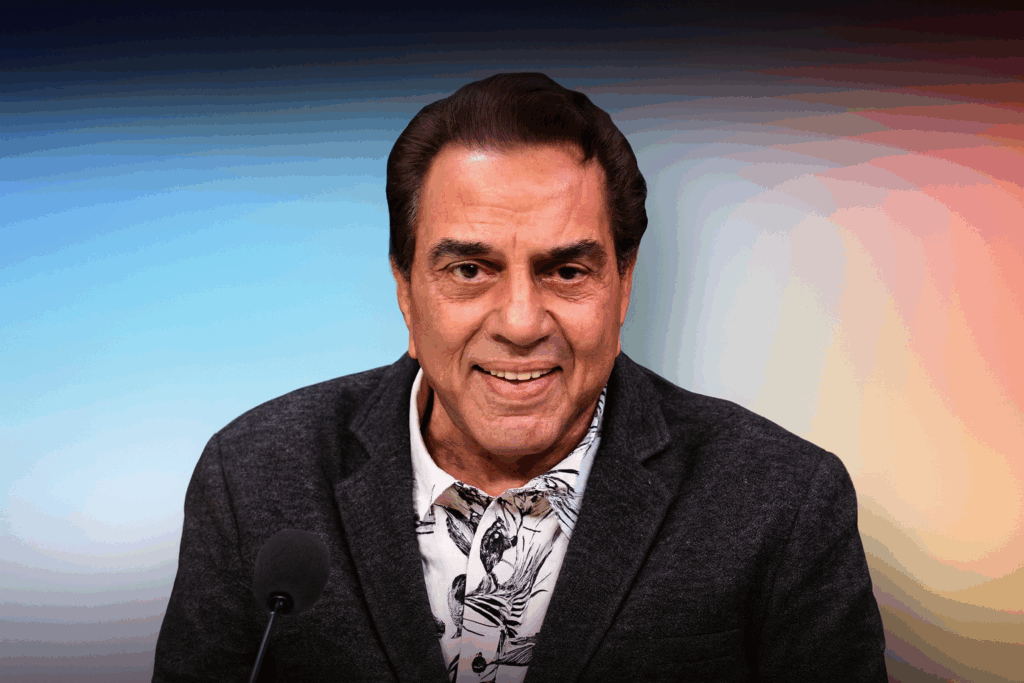Dharmendra Deol, legendary Bollywood actor and cultural icon, died Monday at his Mumbai home at age 89, according to local media. Tributes poured in from across India, marking the passing of a central figure whose presence and versatility shaped Indian cinema for more than six decades.
Though his family did not issue a formal statement, some of the industry’s most celebrated figures, including longtime co-star Amitabh Bachchan, attended his funeral at a crematorium in the Juhu neighbourhood. The gathering reflected the deep reverence Dharmendra commanded throughout his career, which included more than 300 films and helped define the popular image of a Bollywood hero.
Filmmaker Karan Johar, who directed Dharmendra in the 2023 hit Rocky Aur Rani Kii Prem Kahaani, remembered him as “a massive mega star, the embodiment of a hero in mainstream cinema,” writing on Instagram that the actor’s screen aura was “timeless and unmatched.”
Born Dharam Singh Deol in Punjab in 1935, Dharmendra grew up in modest circumstances. He entered films after winning a talent contest organised by Filmfare magazine. This brought him to Mumbai, where he debuted in 1960 and quickly developed a reputation for versatility across genres. Over his career, he performed in arthouse dramas, comedies, romances, and action films, becoming a well-known face in Indian cinema.
Dharmendra’s legacy was cemented with the 1975 blockbuster Sholay. His portrayal of Veeru, the charismatic bandit-hunter, left an enduring impact on Indian cinema and popular culture. The film remains one of India’s most influential, is internationally praised, and is remembered for its memorable lines.
Dharmendra’s on-screen roles projected confidence and strength, while his personal life attracted media attention. He married Prakash Kaur before becoming famous, then later married actress Hema Malini in 1980 after working together on several films. Since he did not divorce Kaur, this second marriage became a widely discussed topic in Bollywood. Dharmendra seldom spoke publicly about the situation, choosing to keep family life private.
In addition to his film career, Dharmendra served as a member of India’s Parliament from 2004 to 2009, representing the Bharatiya Janata Party. Though his attendance in parliament was sporadic, he focused on rural development and cultural preservation during his tenure. Years later, he admitted politics was not his natural home, once remarking in an interview that he was “too emotional” for the political world and preferred the creative energy of filmmaking.
Prime Minister Narendra Modi and President Droupadi Murmu were among the national leaders who offered condolences following his death. Modi wrote on X that Dharmendra was “an iconic film personality, a phenomenal actor who brought charm and depth to every role he played,” adding that his passing marks “the end of an era.”
Despite his extraordinary fame, Dharmendra often described himself as “a simple man” who valued his audience’s affection above awards or accolades. His humility endeared him to fans across generations, many of whom grew up watching his performances evolve from earnest romantic leads to dynamic action heroes and later to beloved elder statesman roles.
Dharmendra is survived by his two wives and six children, several of whom — including actors Sunny and Bobby Deol, and Esha Deol — followed him into the film industry. As tributes continued across social media and television networks on Monday, colleagues emphasised the enduring resonance of his work. His portrayal of Veeru, in particular, remains a benchmark of Bollywood charisma, blending warmth, humour and heroism in a way few performers have matched.
Though the film industry has undergone sweeping changes since Dharmendra’s debut, his influence remains unmistakable. His performances continue to air on television channels, inspire new actors, and shape the emotional memories of millions of moviegoers who grew up seeing him as the quintessential Hindi-film hero. As filmmaker Karan Johar noted, the space he leaves behind is “a gaping hole in the industry… a space that can never be filled.”


